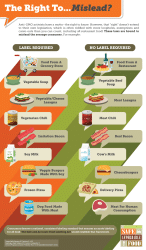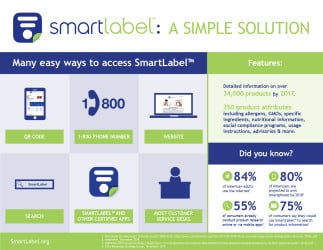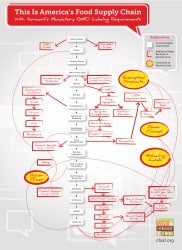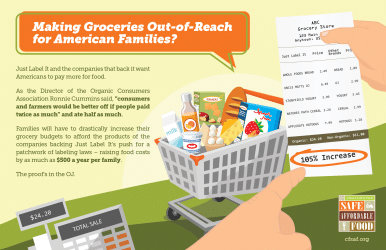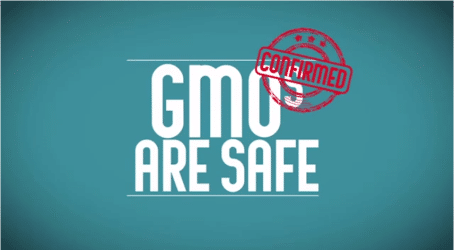
Stand up for Safe,
Affordable Food
Join us in protecting science-based
policies that keep food safe and
affordable for every American.
Learn More About The Uniform, National Food Ingredient Disclosure Standard
In July, President Obama signed into law a uniform, national food ingredient disclosure solution that was passed earlier that month by the U.S. Senate and House of Representatives with overwhelming bipartisan support. The law prevents the confusion and costly red tape associated with a 50-state patchwork of mandatory state labeling laws that could have raised the cost of food for families by up to $1,050 per year. The bipartisan law includes a consistent labeling standard will allow consumers to access more product information than ever before through tools such as SmartLabel TM, and will ensure that foods produced with genetically modified ingredients are not unnecessary stigmatized with an on-package label.
However, the fight is not over. Federal regulators will now begin a long-term process to determine how the law is carried out across the country. Check back for more details about how you can stay engaged as this new law enters the rule-making process at the U.S. Department of Agriculture (USDA).
BENEFITS OF FOOD & AG BIOTECHNOLOGY
The Problem
National Biotech Disclosure Law
BENEFITS OF FOOD & AG BIOTECHNOLOGY
Genetically engineered (GE) technology incorporates desirable traits from nature into crops, resulting in plants that can be healthier, more nutritious and better for the environment. This process is done without introducing anything unnatural or using chemicals.
Here are the many benefits of agricultural biotechnology:
Shrinking our Environmental Footprint
- Biotechnology enables farmers to be better stewards of the environment, allowing farmers large and small to grow more crops on less land while using fewer pesticides and less water.
- In the United States, the adoption of GE crops resulted in pesticide use reduction of 46.4 million pounds in 2003. Globally, GE crops have reduced pesticide spraying (1996-2011) by 9%, or 975 million pounds.
Lowering the Price of Food
- Because they require fewer pesticides, land and water, biotech crops keep food production costs down resulting in lower prices for consumers. Biotechnology helps reduce the price of crops used for food, such as corn, soybeans and sugar beets by as much as 15-30%. Mercaris, a market data researcher, found that 2013 prices for “non-GMO” corn averaged 51 cents per bushel higher than corn produced using biotechnology.
Alleviating Hunger and Malnutrition Around the World
- Biotech crops have helped feed more than 300 million Americans and a global population of 7 billion – of which 1 in 8 suffer from hunger and malnutrition.
- By 2050, the global population is expected to rise to 9 billion. Experts predict we will need 70% more agricultural production to keep pace – utilizing GE crops that increase productivity while reducing land, water and pesticide use will be critical to this achievement.
About the Coalition for Safe Affordable Food
We are a broad-based coalition representing the entire American agriculture food supply chain – from farm to fork. We are committed to increasing the public’s understanding about the science and safety of genetically modified organisms (GMOs) and advocating for science-based policies that keep food affordable for every American.
WE’RE Active in Your Community
FIND OUT MORE ABOUT OUR GROWING LIST OF STATE SUPPORTERS

Check Out Our Media
